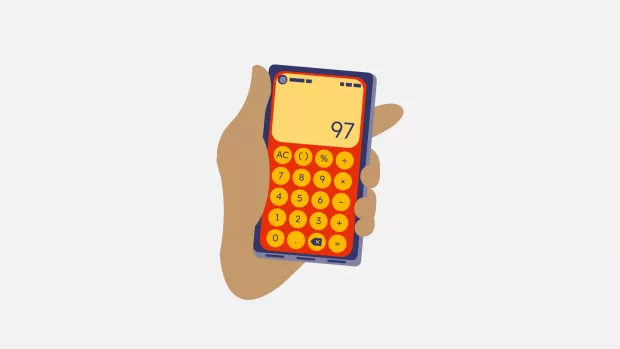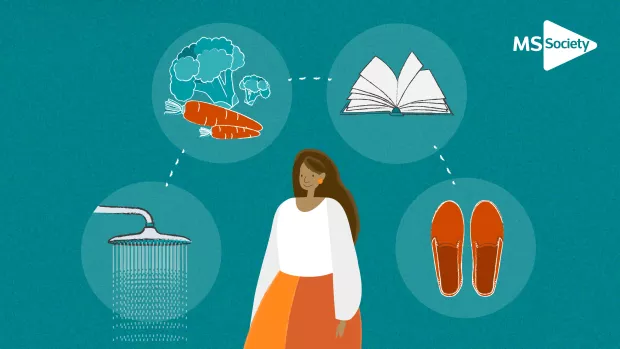
10 tips to help with everyday costs
We know the cost of living crisis is causing challenges for people affected by MS. Our MS Helpline Benefits Advisers have 10 tips that could help you manage your costs at home – from rent and mortgage payments to childcare, council tax and housing advice.
Julian and Rachel work as Benefits Advisers on our MS Helpline: ”Lots of people we’ve spoken to this year don’t know about the advice and financial support they might be entitled to. So we’ve looked at benefits and beyond to share these 10 tips. We hope they help you reduce costs at home and manage these difficult financial times.”
1. Help with your rent if you receive benefits
If you get Universal Credit Housing Element or Housing Benefit to help with renting costs, there might be extra support available too. If these benefits don’t cover your full rent, you might qualify for a Discretionary Housing Payment (DHP). These can help you pay a shortfall in your rent. They’re usually short-term payments. You can apply through your local council.
If you apply but you don’t get awarded the DHP payment, you can challenge the decision. To do that, ask for a revision or write a complaint. Feel free to get in touch with us if you’d like more advice about this.
Find your local council at gov.uk
2. Help with your mortgage if you receive benefits
If you get Universal Credit or income-related ESA, you might qualify for help with your mortgage payments. This is called Support for Mortgage Interest (SMI).
SMI is a loan. You’ll need to repay the money with interest, but not until you sell or transfer ownership of your home. An SMI loan can help pay the interest on up to £200,000 of your loan or mortgage.
You may want to get financial advice before applying for SMI. You can get free mortgage and money advice from Money Helper by calling 0800 138 7777. Or you can visit the Money Helper website for more information.
3. Council Tax Support
If you’re on a low income, you may be entitled to Council Tax Support, or help paying your rates if you’re in Northern Ireland. These reduce your local tax bill. Each local council's scheme is different, and you apply through them. You’re unlikely to be entitled if you have savings over £16,000.
4. Council Tax discounts
Do you have a second bathroom you use to meet your needs? Or enough space to use your wheelchair indoors? If so, you may be able to get a disability-related reduction in your Council Tax. This is called the Disabled Band Reduction Scheme.
If you’re the only adult in your household, you should be entitled to a 25% single person discount on your council tax.
Find out more and how to apply at gov.uk
5. Equipment and practical help
Some symptoms of MS can make everyday tasks and self-care more challenging. If you get help on a day-to-day basis, you may be able to get care and support from your local council.
To get this support, you’ll need to ask for a care needs assessment. The results of that assessment could include recommendations for aids or adaptations to your home to help you do daily tasks. It could also include practical help from a paid carer.
Once you’ve had a needs assessment, you may qualify for a Disabled Facilities Grant – or similar support for equipment or adaptations if you’re in Scotland. A Disabled Facilities Grant comes from your local council and can help you pay for useful adaptations to your home. This could cover things like:
-
widening doors
-
installing ramps
-
installing grab rails
-
A wet room
If you live in Wales, you may also qualify for help from the charity Care and Repair.
Find out about social care support in your nation
6. Housing advice
If you need advice on housing rights, rent or mortgage arrears, eviction or disrepair, visit the Citizen's Advice website for free advice. You can also visit Shelter’s website for more free guidance.
7. Everyday budgeting
Keeping a budget can be useful to track your outgoings and finances. You can use tools like Money Helper’s online budget planner to get you started. You can also use comparison websites like Money Saving Expert and Uswitch to check you’re on the cheapest deal for your gas, electricity, phone, mobile and broadband.
8. Debt
Owing money can add unwanted stress. If you have debt and you’re struggling with repayments, you can get advice and support from Citizens Advice. And through the National Debtline, you can find out if you can reduce your debt payments.
9. Grants for utility debts
As we move into the colder months, expensive energy costs are a big concern for many people. But if you’re struggling to pay gas, electricity or water bills, you can ask your energy provider if they have a grant you can apply for.
Find out more about grants and savings for energy costs
10. Getting financial support if you have children
Looking after children while juggling other outgoings can be hard. But you may be eligible for help covering childcare costs. You can find more information on childcare cost support on the Gov.uk website. You may might also be eligible for free school meals through your local council.



